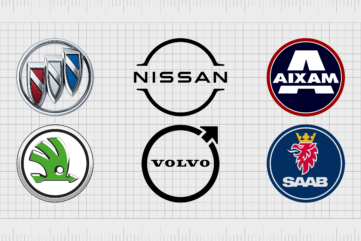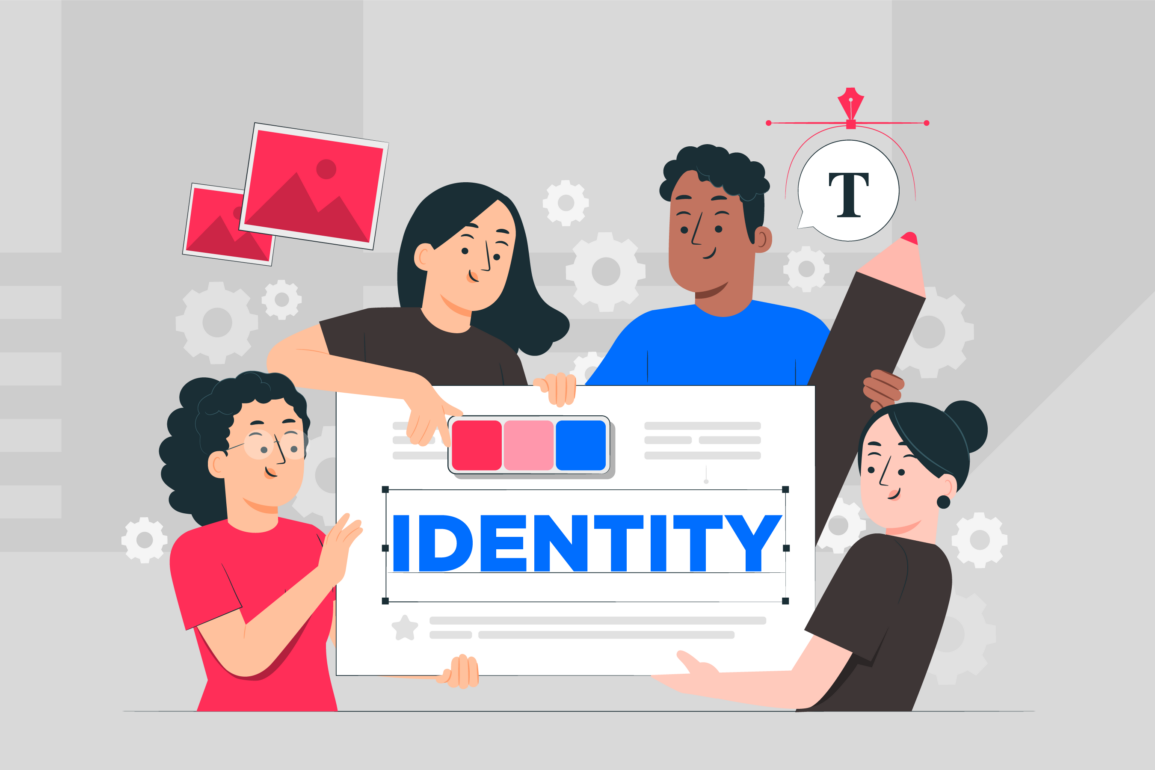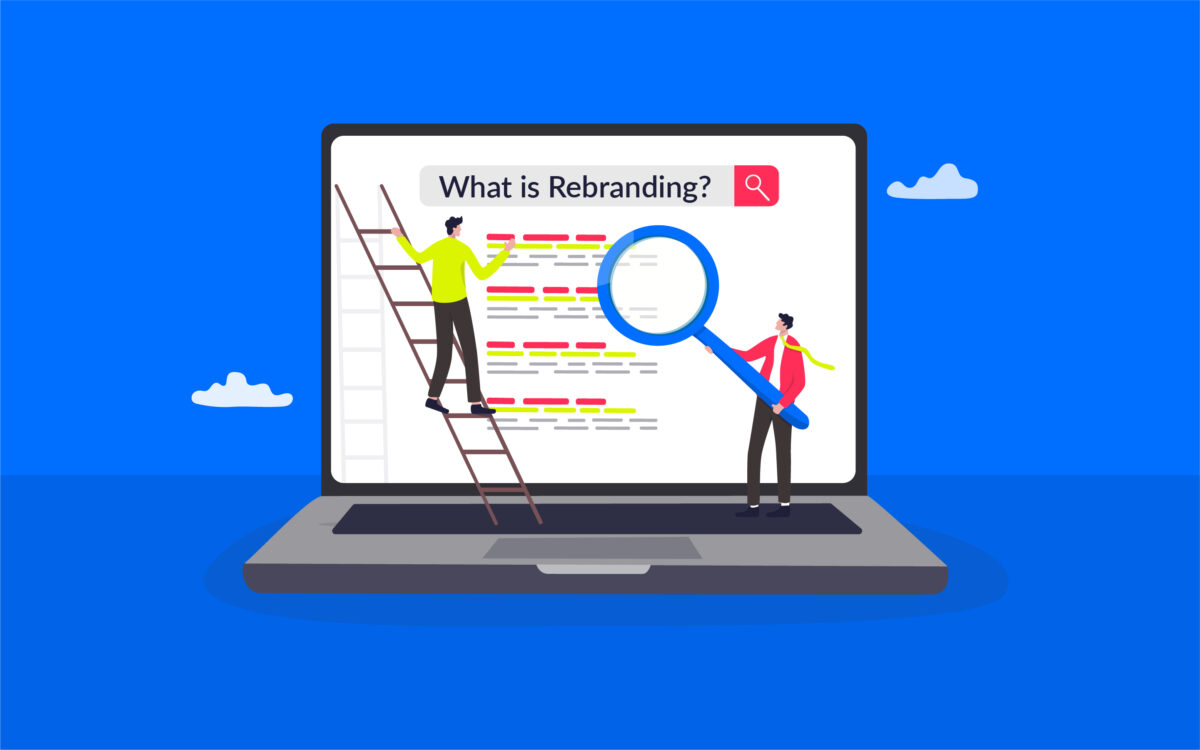Why do companies rebrand? 10 important reasons, benefits and downsides

Why do companies rebrand? Businesses invest a lot of time and effort into developing the right “initial brand” for their organization. It seems unusual, then, that any entrepreneur would consider returning to the drawing board and starting again from scratch.
However, rebranding is a relatively common process. You’ve probably seen examples of it in virtually every industry, from Facebook becoming “Meta” to the transformation of the “Old Spice” brand. The reality is that while rebranding can be complex, it can also be necessary.
Though the image, identity, and personality you built for your company when it first launched may have worked at first, the ever-evolving world means you’re always at risk of becoming irrelevant.
Failing to update, and even change your brand when you’re losing the attention of your target audience, could mean that you lose your market share.
Today, we’re going to explore why companies choose to breathe new life into their identity, with a comprehensive rebranding strategy.
Rebranding a company: What is rebranding?
Before we explore some of the main reasons for the rebranding process, it’s worth defining what “rebranding” actually means. Rebranding isn’t just the process of creating a new logo or look for a company. It’s about changing your entire brand positioning strategy and perception.
The goal of rebranding is to influence how customers feel about you.
This could mean altering your brand values and mission or vision statements, changing your marketing mix, and even updating your brand name.
Rebranding is a time-consuming and substantial process. It involves evaluating or auditing every element of your current brand strategy, and updating your efforts to better serve your goals.
This means rebranding is a little different from a “brand refresh”. With a refresh, companies essentially polish elements of their existing brand, updating their logo, website, and other elements, while retaining their core identity and strategy.
Why would a business want to rebrand? 10 reasons
So, if rebranding takes so much effort, why do companies rebrand at all?
In an ideal world, the corporate identity you build for your company would never need a major change. However, the landscape we live in is constantly evolving and changing. A successful rebrand can take a stagnant company and give it new life.
Used correctly, rebranding can protect you from a bad reputation, improve your reach to new audiences or customer segments, and even increase your potential revenue.
Here are some of the biggest reasons companies rebrand…
1. The brand name or identity doesn’t reflect the brand vision
One of the most common reasons to invest in a full rebrand is that your company’s identity and name no longer reflects your vision. A strong name is often the foundation of your brand’s personality, and brand story. It’s the calling card that appears throughout the buyer’s journey.
If your name, or your wider identity (including your personality, tone or voice, or image), doesn’t reflect your brand vision, it could create confusion for your customers.
The right brand identity needs to connect with your customers on an emotional level. Imagine, for instance, if Google had maintained the name “Backrub.” Would that name and identity have reflected the company’s commitment to innovation in the same way?
2. Your brand is losing clarity or consistency
Brand dilution is a common concern among growing companies. As your business continues to grow, and you try to reach new potential customers, you might find yourself experimenting with a range of different products and marketing messages.
Over time, however, this can lead to a confusing and inconsistent brand experience. A lack of brand focus has caused some major big brands around the world to lose the engagement of their target audience, simply because they don’t know what the company stands for.
If your customers can no longer clearly demonstrate a unique selling point, or a specific value for your target audience, this could be a sign it’s time to rebrand, and refine.
3. The brand no longer differentiates you from the competition
A great brand needs to stand out in an ever-changing marketplace. If your current branding makes your company look and sound just like everyone else in your industry, it may make sense to rebrand.
Branding relies on competitive differentiation, and the ability to show your audience what sets you apart from your competitors. If you don’t have a clearly articulated unique value proposition to engage and convert your customers, you can begin to lose sales and growth opportunities.
A rebrand can be a good way to ensure you’re pulling attention to the things you can do better than any other company. It can also be a good way to shake up the marketplace, separating yourself from other organizations who are replicating your identity.
4. Your business model or strategy has changed
One answer to “Why do companies rebrand” is that they’re changing direction. For instance, Netflix started life as a company that would ship DVDs to customers homes in the post.
However, as the organization evolved, it started to focus on new strategies, creating a streaming platform and original content. This required the company to rethink how it positioned itself in the entertainment landscape, and conduct a complete overhaul of the Netflix brand.
If your business model or strategy means you’re now selling new products, focusing on different services, or even conveying different company values, it’s a good sign a rebrand is the right decision. Your brand should always reflect your company’s mission.
5. You’re undergoing an acquisition or merger
Most mergers and acquisitions will involve some rebranding. During an M&A process, even if you continue to sell the same products or services, the chances are that your portfolio, target market, and overall business strategy will evolve.
You’ll need to rethink your brand architecture to ensure you’re building positive relationships with your evolving audience, and avoid issues with inconsistency and confusion.
You may need to change your name and logo as part of a complete brand overhaul, bringing two disparate companies together into a single entity.
6. You’re expanding beyond your original geography
Usually, small companies focus their branding strategies on appealing to a specific sub-culture or niche of customers. Many branding strategies start of as relatively localized campaigns, designed to appeal to specific cultures and socio-economic groups.
However, as your business grows and you branch out into new international markets, you may need to change your approach to branding. Your name might not be relevant if it includes references to your origins, or doesn’t translate well into other languages.
You may find your company’s image, from your logo to your color palette, or business cards, no longer resonate with customers in different parts of the world. Conducting in-depth customer research and building a new brand with a more global reach can help to ensure growth.
7. The target audience for your brand has changed
Companies don’t necessarily need to expand into new regions to change their target audience or niche. Customers are constantly evolving with the rise of new generations of buyers.
What’s more, as you learn more about your customers, you may find your initial target audience wasn’t right for your business in the first place. For instance, the Tiffany brand had a reputation as being a luxury, heritage company, popular with older customers.
In an effort to entice younger buyers, the company updated its brand to start connecting with new customers, using marketing campaigns like “Not your mother’s Tiffany.”
If your current customers are dwindling and you want to reach a younger audience or a different niche, moving your brand in a new direction can be the best strategy.
8. Your products or pricing strategies are changing
Another of the major answers to “why do companies rebrand” is that they’re pursuing new product and pricing strategies. If you’re branching into a new region with your products, selling more expensive, or luxurious items, you may need to shake your identity as an “affordable vendor”.
You might even find that your existing brand is too restrictive as you begin to evolve. For instance, Starbucks had to move away from the “Starbucks coffee” branding, when it began to introduce different types of foods and beverages into its product catalog.
A rebrand can help companies to increase their brand equity and change their positioning in the eyes of their target audience. It can be an excellent way to take your product portfolio to the next level.
9. Negative perceptions are harming your brand
Sometimes, a rebrand is necessary to disassociate a growing company from previous scandals and problems in the market. Unfortunately, while a positive brand image can take years to build, it only takes a single incident to harm your audience’s relationship with your company.
Potential missteps and business issues can instantly attract the attention of millions of customers in today’s digital world, reducing share prices and equity.
Many business owners have turned to rebranding to try and mitigate negative associations in the past. For instance, after various scandals related to public privacy, Facebook updated its brand to “Meta.”
This both helped to disconnect the company from its previous wrongdoings, and allowed the company to focus its attention on “technology” rather than just social media.
10. You’re not attracting the right talent
An excellent corporate brand isn’t just a powerful tool for attracting customers. Your corporate identity also determines whether you’ll be able to attract crucial members of staff to your team.
We’re living in a world where skill shortages are rife in every industry. The best talent wants to work with brands who share their visions, values, and purpose. Employees want to be proud of the companies they serve, and good branding helps with that.
Rebranding can be an excellent way for companies to make themselves more appealing to potential candidates in their chosen space. It can also offer business owners a chance to update their “employer brand” and showcase their commitment to supporting their teams.
Why rebranding? What are some of the benefits of rebranding?
So, why do companies rebrand? What are the benefits?
Ultimately, a strong brand is the most important asset any business has. According to some studies, companies only have 7 seconds to make a powerful first impression. Much of the initial impact a company has on its audience will be based on its branding strategy.
If your logo, company name, and marketing strategy don’t send the right message about your company, you could end up losing clients forever.
A successful rebranding effort can help businesses to stand out and thrive in a competitive world.
Some of the biggest benefits of rebranding include:
1. Access a larger, more engaged audience
One of the biggest advantages of investing in a new brand identity is the ability to not only reach more customers, but improve your relationships with your target audience. Even if you still want to connect with the same customer base after your rebrand, you’ll be able to build better connections.
Conducting market research during your rebranding effort will help you to determine what core values you should be showcasing to your customers, and what personality or language you should use. This can lead to the acquisition of more potential clients and better brand loyalty.
You can even boost your chances of increasing your market share by running focus groups, and collecting new information about your changing audience.
2. Stronger differentiation
As mentioned above, one of the main reasons why companies rebrand is they’re losing their ability to differentiate in a crowded market. As your marketplace evolves, there’s a good chance more companies will emerge in your sector with similar product offerings.
A rebrand can help you to improve brand recognition and awareness, by giving you new ways to differentiate yourself from your competitors, and showcase your unique value propositions.
A rebrand can even help to differentiate you from your previous identity if negative publicity has already harmed your relationship with your customers.
3. Greater relevance
Rebranding a company can be an excellent way to ensure you stay current in a changing marketplace. Over time, your brand logo, personality, marketing strategy, and other components can start to seem a little outdated.
As your target audience evolves and your market changes, updating your brand can ensure you’re always up to date. Sometimes, a simple logo change will be enough to keep your company ahead of the curve.
However, if the values of your potential clients change and you begin to lose customer engagement, then it might be a good idea to rebrand entirely.
4. Increase your bottom line
Rebranding a business can also be an excellent way to increase your revenue and profit potential. It gives you an opportunity to branch out into new geographies and niches without restriction, earning more customers and fans.
Rebranding also ensures you can position yourself correctly in the minds of your audience, so you can increase your prices, when necessary, without harming conversions. What’s more, because your rebrand will help you to connect with customers on a deeper level, you can boost customer retention.
Creating a more loyal and engaged customer base will significantly increase your potential revenue.
5. Better marketing and presence
Investing in a new identity for your brand can be an excellent way to create cohesion out of chaos. If you’re rebranding because your old brand has become too diluted, then starting from scratch can be a great way to get everyone on your team on the same page.
You can create new brand guidelines and templates to ensure everyone working with your company can send the same message to your target audience.
You’ll also be able to invest in more effective marketing strategies, improving your marketing messages with a tone of voice that engages your customer base.
6. Greater brand equity
A stagnating or irrelevant brand doesn’t just lose customers; it loses value. Companies that fail to adapt to changing marketplaces often struggle to attract investors and partners. Their brand equity begins to suffer, and their value becomes diluted.
Sometimes, rebranding your company, investing in new marketing materials, and strengthening your connections with your target audience can make your company a more valuable asset.
This will positively impact on your brand’s financial performance, as well as your relationships with potential shareholders and investors.
7. Attract top talent
As mentioned above, one of the many reasons why companies rebrand is they’re no longer attracting the right talent to their team. The process of rebranding can be an excellent way to position yourself more effectively to the skilled professionals in your industry.
Updating both your wider brand and your employer brand means you’ll be able to draw more of the best people to your business. Since a company’s success often relies on its ability to cultivate an effective team, your total rebrand could even pave the way for better growth.
A rebrand can even improve your company culture and improve your chances of critical employees staying with your business for longer.
What are the downsides of rebranding?
By this point, you should have a good answer to the question, “Why do companies rebrand?”
Clearly, there are a lot of good reasons to rebrand, and a lot of benefits to investing in the rebranding process. However, rebranding a company doesn’t come without its challenges. Rebrands are complicated and risky procedures.
Even the biggest brands aren’t immune to making mistakes. For instance, when Uber redesigned its logo, a massive 44% of customers said they no longer understood what the business stood for.
Even if you have a compelling reason to rebrand, you may encounter some issues, such as:
1. Confusion
Change can be scary for your company, your employees, and your customers. If you don’t take the time to fully explain your rebranding strategy to your community, this could lead to confusion and chaos. Your customers may feel frustrated or unable to identify your new business.
Publishing press releases, sharing announcements on social media, and being open with your audience about your reasons for rebranding is crucial. Consistent communication is the best way to avoid confusion and retain your audience.
2. Lost customers
There’s always a risk you could lose some of your customers during a rebrand. When you rebrand, you change a variety of different factors that drew existing clients to your business. Your values, image, and identity may no longer resonate with some of your audience.
Explaining your rebrand reasons clearly to customers can help to retain their loyalty. However, you might have to accept the fact that you’re going to ruffle some feathers. The good news is if you do your research, you can attract more new customers to replace the old ones.
3. Cost
Going through a complete rebrand strategy is a daunting task, and it’s often not cheap. You’ll need to pay for everything from a brand-new logo to a color palette, name, domain, and even website redesign. You might also need to invest in strategic help from a brand adviser.
Updating your brand means investing in every aspect of your company, from the content you share online to your marketing materials and even branded uniforms. Be prepared to spend a decent amount of money on rebuilding your brand from scratch.
Is rebranding a business a good idea?
There are many potential answers to the question “Why do companies rebrand?”
Some businesses rebrand because they’re no longer reaching the right target audience or differentiating their company from the competition. Others rebrand because they want to branch into new segments or explore new product lines.
Some organizations even rebrand because they need to distance themselves from bad publicity and previous scandals. Done correctly, a rebrand can be an excellent way to breathe new life into a business, and prep your venture for growth.
However, rebranding is a daunting task. It’s important to ensure you’re investing enough time, effort, and money into enhancing your corporate image and connecting with the right audience.
If you need help with your rebranding process, make sure you’re working with a professional rebranding agency. Contact Fabrik brands today to learn more about how we can help you rebrand.
Fabrik: A branding agency for our times.

We’ve built our reputation, building brands for other people.
Do you need to bring a new brand to life or breathe new life into an existing one? If so, let’s start a conversation





















